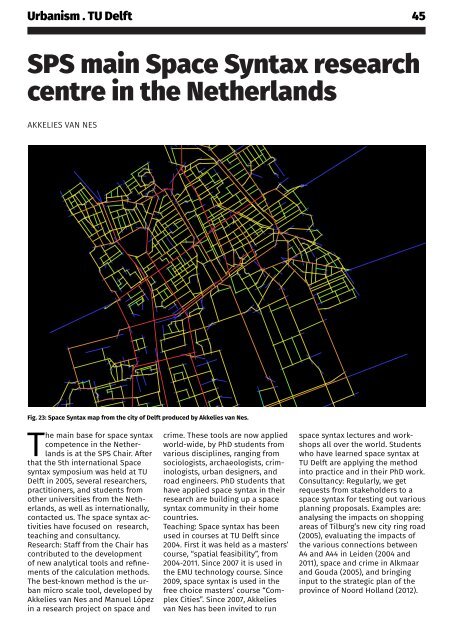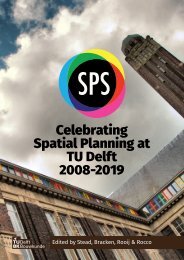*Celebrating Spatial Planning at TU Delft: 2008-2019. Edited by Stead, Bracken, Rooij & Rocco
This is a summary of the achievements of the session Spatial Planning & Strategy of the Department of Urbanism, Faculty of Architecture and the Built Environment, TU Delft, led by Professor Vincent Nadin between 2008 and 2019.
This is a summary of the achievements of the session Spatial Planning & Strategy of the Department of Urbanism, Faculty of Architecture and the Built Environment, TU Delft, led by Professor Vincent Nadin between 2008 and 2019.
Create successful ePaper yourself
Turn your PDF publications into a flip-book with our unique Google optimized e-Paper software.
Urbanism . <strong>TU</strong> <strong>Delft</strong> 45<br />
SPS main Space Syntax research<br />
centre in the Netherlands<br />
AKKELIES VAN NES<br />
100m<br />
Fig. 23: Space Syntax map from the city of <strong>Delft</strong> produced <strong>by</strong> Akkelies van Nes.<br />
The main base for space syntax<br />
competence in the Netherlands<br />
is <strong>at</strong> the SPS Chair. After<br />
th<strong>at</strong> the 5th intern<strong>at</strong>ional Space<br />
syntax symposium was held <strong>at</strong> <strong>TU</strong><br />
<strong>Delft</strong> in 2005, several researchers,<br />
practitioners, and students from<br />
other universities from the Netherlands,<br />
as well as intern<strong>at</strong>ionally,<br />
contacted us. The space syntax activities<br />
have focused on research,<br />
teaching and consultancy.<br />
Research: Staff from the Chair has<br />
contributed to the development<br />
of new analytical tools and refinements<br />
of the calcul<strong>at</strong>ion methods.<br />
The best-known method is the urban<br />
micro scale tool, developed <strong>by</strong><br />
Akkelies van Nes and Manuel López<br />
in a research project on space and<br />
crime. These tools are now applied<br />
world-wide, <strong>by</strong> PhD students from<br />
various disciplines, ranging from<br />
sociologists, archaeologists, criminologists,<br />
urban designers, and<br />
road engineers. PhD students th<strong>at</strong><br />
have applied space syntax in their<br />
research are building up a space<br />
syntax community in their home<br />
countries.<br />
Teaching: Space syntax has been<br />
used in courses <strong>at</strong> <strong>TU</strong> <strong>Delft</strong> since<br />
2004. First it was held as a masters’<br />
course, “sp<strong>at</strong>ial feasibility”, from<br />
2004-2011. Since 2007 it is used in<br />
the EMU technology course. Since<br />
2009, space syntax is used in the<br />
free choice masters’ course “Complex<br />
Cities”. Since 2007, Akkelies<br />
van Nes has been invited to run<br />
space syntax lectures and workshops<br />
all over the world. Students<br />
who have learned space syntax <strong>at</strong><br />
<strong>TU</strong> <strong>Delft</strong> are applying the method<br />
into practice and in their PhD work.<br />
Consultancy: Regularly, we get<br />
requests from stakeholders to a<br />
space syntax for testing out various<br />
planning proposals. Examples are:<br />
analysing the impacts on shopping<br />
areas of Tilburg’s new city ring road<br />
(2005), evalu<strong>at</strong>ing the impacts of<br />
the various connections between<br />
A4 and A44 in Leiden (2004 and<br />
2011), space and crime in Alkmaar<br />
and Gouda (2005), and bringing<br />
input to the str<strong>at</strong>egic plan of the<br />
province of Noord Holland (2012).




